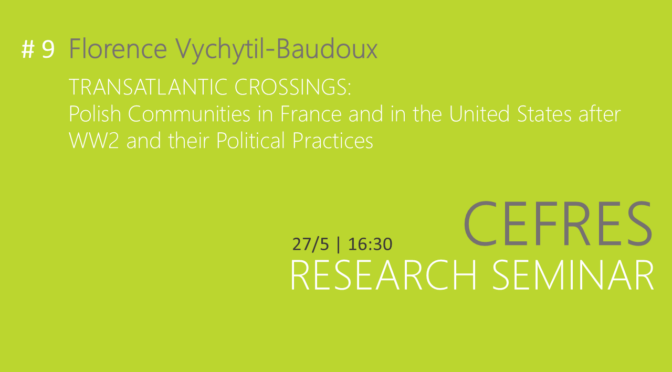Polish Communities in France and in the United States after WW2 and their Political Practices
9th session of CEFRES in-house seminar
Through the presentation of works in progress, CEFRES’s Seminar aims at raising and discussing issues about methods, approaches or concepts, in a multidisciplinary spirit, allowing everyone to confront her or his own perspectives with the research presented.
Location: CEFRES Library and online (to get the link, write to cefres[@]cefres.cz)
Date: Tuesday, May 27, 2025 at 4:30 pm
Language: English
Speaker: Florence Vychytil-Baudoux (EHESS / CEFRES)
Chair: Françoise MAYER
Text to be read: Michael Werner & Bénédicte Zimmermann, « Beyond Comparison: Histoire Croisée and the Challenge of Reflexivity », History and Theory, 2006, vol. 45, no 1, p. 30‑50.
Abstract:
Between the 1880s and the 1930s, over 12 million people left Polish territories “za chlebem” (for bread). While before WW1 the United States attracted most Polish peasants looking for a better future, it was France that became the main destination for Polish migrants in the interwar period.
In both countries, as in others, Polish immigrants established vibrant communities that have received substantial attention from sociologists and historians over the years. More often than not, their approaches have been grounded in methodological nationalism; attempts at “breaking free from the Nation-state corset” (Walaszek, 2001) generally consist in a mere collection of papers embracing host states as a “natural” unit of analysis, loosely tied together by a general introduction. However impressive they are, those accumulations of data bear little to no additional heuristic value: in addition to naturalizing host states as spaces of reference, they also tend to conflate Polish experiences abroad under the category “diaspora” (or the emic term “Polonia”) and to essentialize “Polish (immigrant) identity(ies)”.
While connections and interactions between Polish communities in different countries have largely remained outside of the scope of “divergent comparisons” (Green, 2004), I contend that the transformations that occurred in France and in the United States following WW2 and through the Cold War cannot be understood without a relational approach. Indeed, within a few years of each other, Poles on either side of the Atlantic started to implement similar ideas and practices to increase their political leverage, despite the different if not opposed political systems they operated in. Locating and analyzing interactions between both communities sheds light on the translocally dialectic dimensions of the processes at stake and shows how locally embedded political practices and strategies were framed by norms and values derived from collective representations that connected multiple spaces and temporalities.
Ultimately, resisting the temptations of both methodological nationalism and transnationalism, a relational approach of “particularities and locale” opens up new conceptual and epistemological perspectives: in particular, unpacking the complex and ambivalent relationships between national and diasporic narratives allows us to engage with, and shift away from, normative understandings of emic categories such as “Polonia”.
Please find the complete program of 2024–2025 seminar here.

